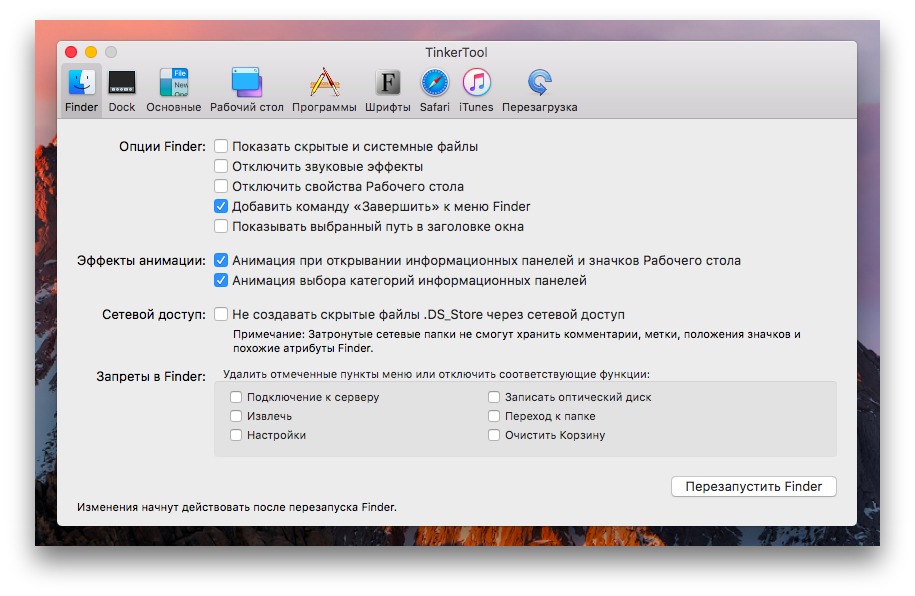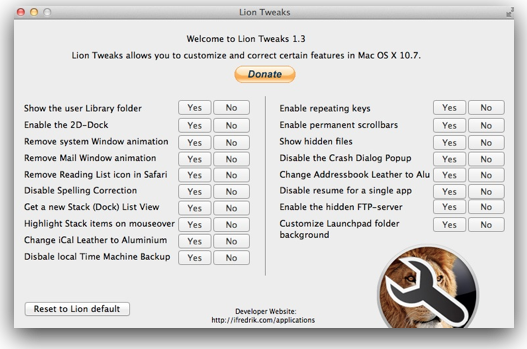- Tinkertools System Reviews
- Tinkertool System For Mac
- Tinkertools System Map
- Command Heat Shrink Tool Holders
TinkerTool running on macOS Mojave with 'General' preferences pane open. | |
| Initial release | December 7, 2010 |
|---|---|
| Stable release | |
| Operating system | macOS |
| Available in | Multilingual |
| Type | Utilities |
| License | Freeware |
| Website | www.bresink.com/osx/TinkerTool.html |
| Usage | |
Oct 18, 2019 TinkerTool is an application that gives you access to additional preference settings Apple has built into Mac OS X. This allows to activate hidden features in the operating system and in some of the applications delivered with the system. The tool makes sure that preference changes can only affect the current user.
TinkerTool is a freeware application for macOS that allows the user to customise the system by exposing hidden preferences to a graphical user interface (GUI).[1] It is developed by German developer Marcel Bresink Software-Systeme. Its latest release is version 7.4.2, which is optimised for macOS Catalina and many features that came with it.[2]
Features[edit]
TinkerTool gives users access to hidden system and application preferences that Apple has built into macOS, but not integrated into GUI preferences menus. Although users can typically access these through Terminal operations, TinkerTool assembles them and provides a GUI similar to Apple’s System Preferences application for easier access.
By using Apple’s hidden preferences, the application only commits changes that are reversible and affect the preferences of the current user account. Administrative privileges or background processing are not required. The application also supports a reset option to reset all preferences to Apple's defaults, or to the state that existed before using the application.
History[edit]
Initially, TinkerTool worked with all versions of macOS. However, over the years, compatibility with particular versions of macOS was spun off into separate applications: TinkerTool Classic, TinkerTool Classic Generation 2, TinkerTool 4, TinkerTool 5, TinkerTool 6, and the current TinkerTool. Support therefore goes back to Mac OS X 10.1 Puma and later.[3]
Versions[edit]
TinkerTool versions are specific to versions of macOS and are not backward compatible. The program will not work correctly if used with an OS for which it was not designed.
- Mac OS X 10.2 Jaguar: TinkerTool Classic, v3.9.5
- Mac OS X 10.3 Panther: TinkerTool Classic, v3.9.5
- Mac OS X 10.4 Tiger: TinkerTool Classic Generation 2, v4.5
- Mac OS X 10.5 Leopard: TinkerTool Classic Generation 2, v4.5
- Mac OS X 10.6 Snow Leopard: TinkerTool 4, v4.97
- Mac OS X 10.7 Lion: TinkerTool 4, v4.97
- OS X 10.8 Mountain Lion: TinkerTool 4, v4.97
- OS X 10.9 Mavericks: TinkerTool 5, v5.7
- OS X 10.10 Yosemite: TinkerTool 5, v5.7
- OS X 10.11 El Capitan: TinkerTool 5, v5.7
- macOS 10.12 Sierra: TinkerTool 6, v6.5
- macOS 10.13 High Sierra: TinkerTool 6, v6.5
- macOS 10.14 Mojave: TinkerTool, v7.4.2
- macOS 10.15 Catalina: TinkerTool, v7.4.2
The macOS Catalina (10.15) build is actively maintained. However, all previous versions in support of past operating systems are still available for download from the developer's website
See also[edit]
References[edit]
- ^Bresink, Marcel. 'TinkerTool: Description'. Software-Systeme. Retrieved 23 February 2019.
- ^Bresink, Marcel. 'TikerTool: What's new?'. Software-Systeme. Retrieved 23 February 2019.
- ^TinkerTool versions
External links[edit]
Tinkertools System Reviews
| Original author(s) | Jay Ponder, Pengyu Ren, Jean-Philip Piquemal |
|---|---|
| Developer(s) | Jay Ponder Lab, Department of Chemistry, Washington University in St. Louis; Pengyu Ren Lab, Department of Biomedical Engineering, the University of Texas at Austin; Jean-Philip Piquemal, Sorbonne University, |
| Initial release | September 8, 2004; 15 years ago |
| Stable release | |
| Written in | Fortran 95, CUDA, OpenMP and MPI Parallel |
| Operating system | Windows, OS X, Linux, Unix |
| Available in | English |
| Type | Molecular dynamics |
| License | Proprietaryfreeware[1] |
| Website | tinkertools.org |
| Usage | |
Tinker, stylized as TINKER, is a computer software application for molecular dynamics simulation with a complete and general package for molecular mechanics and molecular dynamics, with some special features for biopolymers. The core of the package is a modular set of callable routines which allow manipulating coordinates and evaluating potential energy and derivatives via straightforward means.
Tinker works on Windows, OS X, Linux and Unix. The source code is available free of charge under a restrictive license. The code is written in portable FORTRAN 77, FORTRAN 95 or CUDA with common extensions, and some C.
Core developers are: 1) the Jay Ponder lab, at the Department of Chemistry, Washington University in St. Louis, St. Louis, Missouri. Laboratory head Ponder is Full Professor of Chemistry (main appointment), Biochemistry and Molecular Biophysics, and Biomedical Engineering; 2) the Pengyu Ren lab , at the Department of Biomedical Engineering University of Texas in Austin, Austin, Texas. Laboratory head Ren is Full Professor of Biomedical Engineering; 3) Jean-Philip Piquemal's research team at Laboratoire de Chimie Théorique, Department of Chemistry, Sorbonne University, Paris. Research team head Piquemal is Full Professor of Theoretical Chemistry.


Features[edit]
The Tinker package is based on 3 codes: i) the canonical Tinker (version 8.); ii) the Tinker-OpenMM package for Tinker's use with GPus; iii) the Tinker-HP package for massively parallel MPI applications on CPus and Xeon Phi . Tinker-HP received the 2018 Atos-Joseph Fourier Prize in High Performance Computing.
Programs are provided to perform many functions including:
Tinkertool System For Mac
- energy minimizing over Cartesian coordinates, torsional angles, or rigid bodies via conjugate gradient, variable metric or a truncated Newton method
- molecular, stochastic, and rigid body dynamics with periodic boundaries and control of temperature and pressure
- normal mode vibrational analysis
- distance geometry including an efficient random pairwise metrization
- building protein and nucleic acid structures from sequence
- simulated annealing with various cooling protocols
- analysis and breakdown of single point potential energies
- verification of analytical derivatives of standard and user defined potentials
- location of a transition state between two minima
- full energy surface search via a Conformation Scanning method
- free energy calculations via free energy perturbation or weighted histogram analysis
- fitting of intermolecular potential parameters to structural and thermodynamic data
- global optimizing via energy surface smoothing, including a Potential Smoothing and Search (PSS) method
See also[edit]
References[edit]
- Lagardère, Louis; Jolly, Luc-Henri; Lipparini, Filippo; Aviat, Félix; Stamm, Benjamin; Jing, Zhifeng F.; Harger, Matthew; Torabifard, Hedieh; Cisneros, Andrés; Schnieders, Michael; Gresh, Nohad; Maday, Yvon; Ren, Pengyu; Ponder, Jay; Piquemal, Jean-Philip (2018). 'Tinker-HP: a Massively Parallel Molecular Dynamics Package for Multiscale Simulations of Large Complex Systems with Advanced Point Dipole Polarizable Force Fields'. Chemical Science. 9 (4): 956–972. doi:10.1039/C7SC04531J. PMC5909332. PMID29732110.
- Harger, Matthew; Li, Daniel; Wang, Zhi; Dalby, Kevin; Lagardère, Louis; Piquemal, Jean-Philip; Ponder, Jay W.; Ren, Pengyu (2017). 'Tinker-OpenMM : Absolute and Relative Alchemical Free Energies using AMOEBA on GPUs'. Journal of Computational Chemistry. 38 (23): 2047–2055. doi:10.1002/jcc.24853. PMC5539969. PMID28600826.
- Ren, Pengyu; Ponder, Jay W. (2003). 'Polarizable Atomic Multipole Water Model for Molecular Mechanics Simulation'. The Journal of Physical Chemistry B. 107 (24): 5933–5947. doi:10.1021/jp027815+.
- Pappu, Rohit V.; Hart, Reece K.; Ponder, Jay W. (1998). 'Analysis and Application of Potential Energy Smoothing and Search Methods for Global Optimization'. The Journal of Physical Chemistry B. 102 (48): 9725. doi:10.1021/jp982255t.
- Kong, Yong; Ponder, Jay W. (1997). 'Calculation of the reaction field due to off-center point multipoles'. The Journal of Chemical Physics. 107 (2): 481. Bibcode:1997JChPh.107..481K. doi:10.1063/1.474409.
- Dudek, Michael J.; Ponder, Jay W. (1995). 'Accurate modeling of the intramolecular electrostatic energy of proteins'. Journal of Computational Chemistry. 16 (7): 791. CiteSeerX10.1.1.502.6823. doi:10.1002/jcc.540160702.
- Kundrot, Craig E.; Ponder, Jay W.; Richards, Frederic M. (1991). 'Algorithms for calculating excluded volume and its derivatives as a function of molecular conformation and their use in energy minimization'. Journal of Computational Chemistry. 12 (3): 402. CiteSeerX10.1.1.511.419. doi:10.1002/jcc.540120314.
- Ponder, Jay W.; Richards, Frederic M. (1987). 'An efficient newton-like method for molecular mechanics energy minimization of large molecules'. Journal of Computational Chemistry. 8 (7): 1016. doi:10.1002/jcc.540080710.
License[edit]
Tinkertools System Map
External links[edit]
- Tinker on Twitter